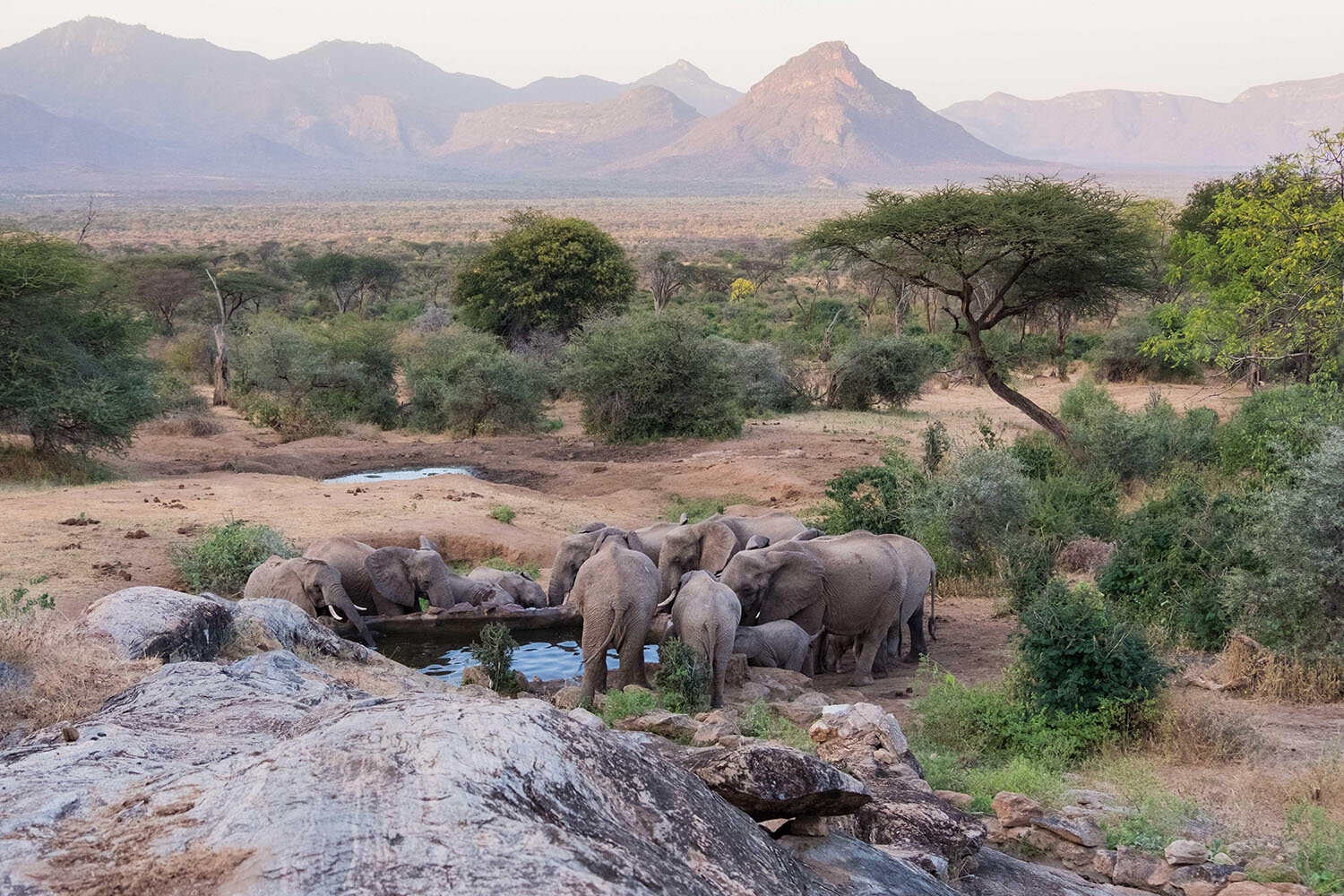Elephants at the Waterhole!
Elephants at the waterhole! The news on the 2-way radio announced that a herd of elephants was heading towards the water hole at the base of the lodge. Robert, my Samburu guide, looked over his shoulder from the driver’s seat and relayed the news. “Let’s go!” I said eagerly. He shifted into gear and headed back to camp as fast as the potholed dirt track would allow without dumping Resin, our Samburu spotter, perched on the roof of the land cruiser.
As we emerged out of the brush, a female elephant and two small calves hurried across the road in front of us. Robert slowed so they could pass. Suddenly, a large elephant raced at us through the dust, ears flared, trumpeting a warning at us. My heart raced; I’d never had an elephant charge at me before. It was a short run— the guardian shook her head in warning then turned and followed the rest of the herd towards the water hole at the base of the lodge.
Robert parked and I quickly gathered up my cameras and backpack and climbed up the steps to the open veranda of the lodge. There, directly below us, were over a dozen elephants. They fanned out in a semi-circle around the edge of the water hole.
Using their trunks like a big straw the elephants took long inhales of water then shot the water directly into their mouths.
The smallest in the crowd hung their trunks over the edge trying to figure just how this drinking thing worked. Baby elephants are comics, providing endless entertainment as they learn how to use their trunks. You can almost hear their thoughts, “What am I supposed to do with this thing?” as they swing their tiny trunks around grabbing at branches, slapping their friends, dipping into water.
A long sloping spit of granite led from the veranda to the water hole. Camera in hand I sat on my bum and slowly inched down the rock. Puket, my protective Samburu escari (guard), shadowed me as we moved silently in tandem closer to the elephants. I could see a set of tiny feet hidden amongst the legs of the mothers and aunties. I zoomed in trying to catch a glimpse of what had to be a newborn baby. The larger elephants shielded the calf completely. I tried to imagine what it would feel like sheltered amongst the massive bodies of the elephant family phalanx.
I had never been so close to a herd of elephants outside of a vehicle. I was both nervous and excited. My viewfinder and telephoto lens allowed me to zoom in on details. I was mesmerized by the action, the dripping trunks, the shuffling bodies, the revelation of tiny feet when an adult shifted her weight. Elephant breasts, and suckling calves hidden then revealed when positions were changed at the water trough.
Eventually the elephants began to peel away after quenching their thirst. It was the end of the day; I kept on shooting as long as the light allowed. As daylight faded so did the elephants, silently slipping back into the surrounding brush. I crawled back up the rock to the veranda, my heart bursting with the thrill of my extraordinary close up encounter. No need to go on a game drive that afternoon—my first day in Samburu Country and the elephants came to me.
During this time of pandemic, the safari industry in Africa has been completely shut down. The communities that depend on visitors for employment are at home without work. Tourists not only account for a significant part of the economy in East Africa, they also add extra eyes on the ground for wildlife surveillance. Travelers help fund conservation, education, land preservation, and research. Today, Kenya Wildlife Service Rangers are still at work, risking their lives for the protection of wildlife, but the financial and physical support of visitors and staff in the hospitality industry is gone. Poaching is on the rise. I hope my stories not only entertain and inform, but also raise awareness about endangered wildlife. When we care and protect wildlife and wild places, we also take care of ourselves. It’s all connected, our climate, our actions, our future. Profits from the sale of items in my online store go to conservation efforts in Kenya. Drip by drip we can make a difference.








